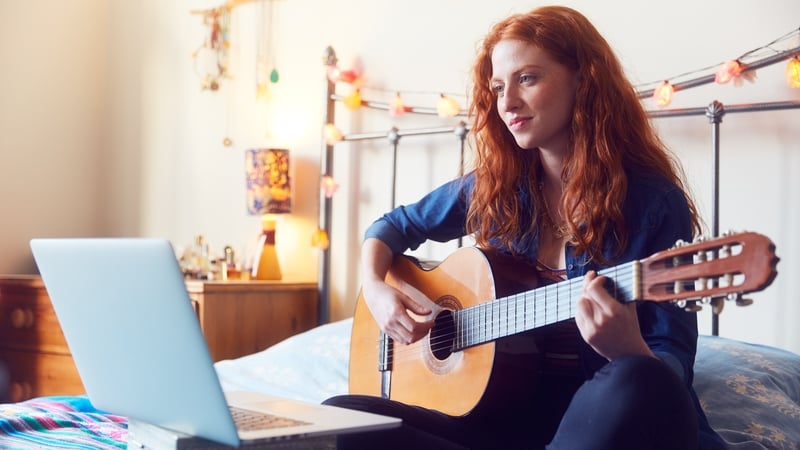Opinion: the move to online learning has highlighted the deeply social nature of how we learn to play music
When I ordered a guitar from Thomann last month to begin learning to play, I found that nearly all of the lower-cost beginner models were sold out. Clearly I'm not the only person in Ireland taking up a new skill while stuck at home in lockdown, though I’m lucky enough to count this as part of my job, in which I study how people learn rock music.
The ability to learn an instrument from home during the pandemic has been made even easier by the sheer number of inexpensive online learning tools available to anyone with an internet connection, from HomeSchoolPiano to Fender Play to the Online Academy of Irish Music. Our ability to learn anything from home has never been greater, and it seems that many of us in Ireland are taking advantage of these opportunities.
We need your consent to load this rte-player contentWe use rte-player to manage extra content that can set cookies on your device and collect data about your activity. Please review their details and accept them to load the content.Manage Preferences
From RTÉ Radio 1's Today show, teacher and RTÉ Concert Orchestra oboist David Agnew on learning a musical instrument in lockdown
In many ways, music learning seems tailor-made for a crisis that forces most of us to remain at home. Learning to sing or play an instrument is often portrayed as a solitary activity: listening to music through headphones, practicing alone, or at most working one-on-one with a teacher. The ways we speak about the value of music, and our enjoyment of it, also tend toward the individual. Common ways of discussing music point to inner emotions and individual passions, personal meanings that we attribute to certain songs or sounds.
And yet...The move to learning entirely online has shown how these ideas we have of music only tell part of the story. It has, I believe, highlighted the deeply social nature of learning music.
Nearly all music education programmes include an ensemble element of some sort, from the pub session in Irish traditional music and the school choir to the highly regimented marching bands of my own youth in the American Midwest. Even rock music schools, a relatively new player on the music education scene, put a lot of stock in group playing. One of the key selling points of School of Rock, with whom I am currently researching, is that students are enrolled simultaneously in both individual lessons and performance groups, who work together toward a showcase performance at the end of each 'season' (generally around four months).
We need your consent to load this rte-player contentWe use rte-player to manage extra content that can set cookies on your device and collect data about your activity. Please review their details and accept them to load the content.Manage Preferences
From RTÉ Radio 1's Morning Ireland, Toner Quinn from the Journal of Music and folk singer Daoirí Farrell on the changing landscape of music performance in the digital age
Ensemble singing or playing has been a persistent component of music education, even as underlying philosophies and approaches to teaching music have otherwise transformed. Rehearsing and performing in a group brings an additional, and it would seem vital, piece to the table – whether in learning to listen to and work together with others, or simply being able to play different works beyond the solo repertoire.
But musicians of all types, and from all corners of the globe, have reported that platforms like Zoom and Skype simply do not provide suitable substitutes to playing together live. Even the slightest delay in sound will throw off the other players, resulting in a chaotic snowball effect. The delay issue with video-conferencing technologies has forced even the best-resourced musicians to pre-record parts and then layer them together, as was made especially clear in some of the performances for last month’s ‘One World: Together at Home’ concert
We need your consent to load this rte-player contentWe use rte-player to manage extra content that can set cookies on your device and collect data about your activity. Please review their details and accept them to load the content.Manage Preferences
From RTÉ Radio 1's Arena, RTÉ Entertainment journalist Alan Corr discusses the One World: Together At Home online concert
The lack of in-person playing also highlights the intensive bodily work that goes into group playing. Ensemble players of all stripes are taught to watch each other, coordinating subtle cues that allow them to keep time and to navigate transitions in the music. These can be anything from pre-arranged hand movements to visible breaths to eye contact, cues which become far more difficult to spot and execute through a screen, if they are even visible at all.
The same is true of the teacher-student relationship. Most of the music teachers I know have moved to online teaching and, while easier to navigate digitally, lessons also become more difficult when mediated by a screen. Singing or playing an instrument is a deeply visceral activity, engaging the whole body, and teaching someone to do so is most efficiently done in person.
It is worth considering the things we miss when we cannot sing, play and learn together in person.
Music teachers use idiosyncratic combinations of vocal instruction, physical demonstration and listening. They pay attention at once to sound, body movements and the student’s engagement with the written music. Many will step in to demonstrate how a line should sound, then have the student play it back. All of these things are possible over, say, Zoom, but they are far more difficult. They require a much more intensive watching, and certain things that would be obvious in person are bound to be missed. Furthermore, many music teachers are navigating the move online for the first time, while also dealing with the significant loss of income from cancelled gigs and other work that requires in-person connection.
It is worth being cautious about the potential for a longer-term, larger-scale move to teaching and learning music online. At the moment, it is necessary, and it is a wonderful thing that our current technology allows for this sort of learning. But it is worth also considering the things we miss when we cannot sing, play and learn together in person.
The views expressed here are those of the author and do not represent or reflect the views of RTÉ


